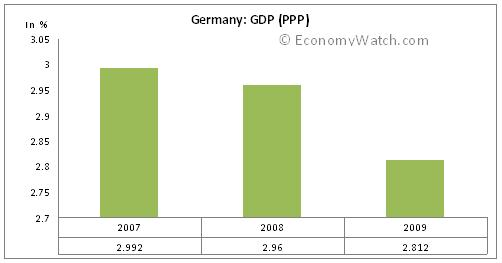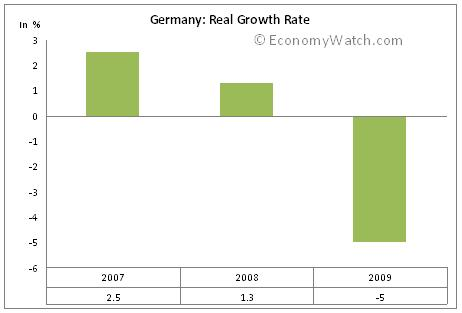Introduction
Germany practices an open economy based on a strong economic base which amounts for a third of the gross domestic product (GDP). German economy is influenced by competitions in the global market especially in international mobile and capital technology. It practices capitalism and free market in order to enhance their competitiveness in the global economic arena. The government only exercises regulation and subsidizes sectors like coal mining and agriculture.
Macro-Economic Picture of Germany
In the European Union bloc, Germany has the largest population. In the year 2009, the population of Germany was estimated to be 81.8 million. Its prosperous economy attracts a lot of immigrants from all corners of the world. In terms of nominal GDP, Germany ranks 4th while in terms of purchasing power, it ranks 5th in the world.
Germany is considered a technological and scientific development hub. It is a global dominant actor in the industrial production of machinery, chemicals, vehicles and other household implements. Despite the global recession, German economy was considered one of the stable economies in the world. Figure 1 below indicates how German economy performed during the global financial crisis period from 2007 to 2009.

German’s GDP is one of the strongest in the world. In 2009, its per capita GDP was $34,200, down from $35,500 in 2008. During this period, the rate of unemployment grew from 7.8% in 2008 to 8.2% in 2009. This is largely linked to slow industrial growth to less import productivity (Economy Watch 1). This is indicated in figure 2 below.

The current unemployment rate in Germany stands at 7.5%. The following is the current contribution of various sectors to the economy in the year 2010.
Major Economic Contributors
Agriculture contributes approximately 0.9 percent of the GDP. Among the agricultural products grown are corn, wheat, sugar, barley and hops. Industrial sector accounts for 26.8 percent of the economy. Products from the industrial sector include cars, chemicals, medical equipment, and aerospace equipment.
In terms of trade, Germany exported goods worth $1.124 trillion. The major exports were chemicals, motor vehicles, steel, iron and electrical products. Their major markets are France, US and the Netherlands. German imports goods worth $937 billion. Their major imports are petroleum products, manufactured goods, apparel, and electrical products.
Their major suppliers are Netherlands, China and France. Germany’s economy is export oriented and forms basis of micro-economic expansion and these exports amount to a third of the national income. Germany imports represent 12.56 percent of the economy while exports account for 14.099 percent of the GDP.
Nature of German Economy
Germany practices social protection where the state is a dominant actor in the economic realm. It does not have natural resources except coal, wood and minerals, hence most of their raw materials are imported (Siebert 19). Germany’s economy is a mix of government regulated and one of a free market.
The government specifically regulates social and labor issues. Most of the companies operating in Germany are built around a technological knowledge. Private ownership plays a significant role in the ownership of various companies and hence owner-entrepreneur is the main driving force. There is growing unemployment in Germany. This is associated with wage formation, reservations of wages and weakening demand for labor.
German Economic Ranking
Germany experience low birth rates, this implies that an aging population is inescapable and continues to be an economic challenge in future (Mueller 281).
Germany ranks second globally in market and economic competitiveness after USA. This is largely due to ownership laws and its exemplary general law and order. In the 2011 global competitive index, Germany was ranked one step lower than the 2010 ranking in position six with an indicative score of 5.41.
Global competitiveness is based on twelve pillars, these pillars are: infrastructure, institutions, macroeconomic environment, health and primary education, higher education and training, goods market and efficiency, labor market efficiency, financial market development, technological readiness, market size, business sophistication and innovation (Klaus 57).
The economic freedom score of Germany is 71.8 and it is ranked 23rd most free in the world. It has experienced increase in six out of the ten indicators of economic freedom. This ranking is higher when compared with the global average.
Germany in the Global Economy
Germany has withstood the challenges of the global environment to emerge as one of the most powerful and dynamic economy. It has strong business and investment freedom which is supported by openness to global commerce, excellently protected property rights and favorable business regulatory environment. Germany also treats foreign and local investors equally (Heritage foundation 1).
Germany is a deeply divided country in terms of income. There is an increase in the rate of poverty. Majority of the population live in less than 60 percent of the median household income. Children are the most hit by poverty. It is evident from the OECD records which show that the rate of poverty in Germany is growing at an exponential rate than any other OECD country.
In order to eliminate poverty, the government has proposed an elimination of part-time employment and temporary jobs and instead it has promoted the revision of wage structure and full time employment. Women and the minorities are relegated in economic activities in Germany.
Ranking of nations is necessary in order to enhance global competitiveness. It enables some countries to utilize their opportunities outside the nation by using its strengths. Germany, with one of the strongest economies in the world exerts a lot of influence in the global economy.
Germany plays a fundamental role in arranging the global monetary system. Germany is a major contributor to the European Union hence its solvency problems pose a threat to the refinancing of the EU; it has therefore the responsibility to push for the implementation of sound fiscal policies within the Euro zone (Weidmann 2).
Conclusion
Germany economy is growing at an exponential rate. The economy is primarily driven by domestic market which comprise of capital formation in machinery, equipment and consumption expenditure. Germany has also experienced growth in exports and imports but the share of export and import contributes less than the domestic market.
The government in Germany, unlike in some other countries, play limited role in the economy, only particularly that of regulation and subsidizing some sectors. Women and minority groups are sidelined in playing a role in the economy. According to the OECD standards, a significant percentage of the population of Germany fall in the poverty level and it is considered the highest poverty level in the OECD bloc. Being a major contributor to the European Union, Germany is an actor in the global economy.
Works Cited
Economy Watch. Germany Economy. Economy Watch, 2011. Web.
Heritage Foundation. 2011 index of economic freedom. Heritage Foundation, 2011. Web.
Klaus, Schwab. The Global competitiveness report 2011–2012. We Forum, 2011. Web.
Mueller, Anthony. “The German Economy: Europe’s faltering Giant”. The Independent Review 12.2 (2007), 279–283.
Siebert, Horst. The German economy: beyond the social market. Princeton, NJ: Princeton University Press, 2007. Print.
Weidmann, Jens. Germany’s role in the global economy. BIS, 2011. Web.